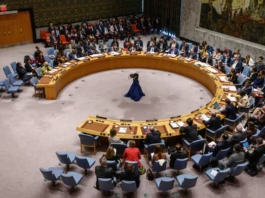Introduction to Competing Political Ideologies
In the contemporary political landscape of Israel, two significant figures represent divergent visions for the nation’s future: Prime Minister Benjamin Netanyahu and Opposition Leader Yair Lapid. Each leader embodies distinct political ideologies that reflect their views on governance, security, and Israel’s role in the Middle East. Understanding their backgrounds is crucial for grasping how these differing perspectives shape the socio-political fabric of Israel.
Benjamin Netanyahu, a long-standing figure in Israeli politics, is known for his right-wing nationalist approach. He has served multiple terms as Prime Minister and has built a reputation as a strong proponent of national security and defense. Netanyahu’s policies often emphasize the importance of maintaining a robust military presence and a hardline stance against perceived threats, particularly from neighboring states and militant groups. His political career has been marked by a focus on economic liberalization, coupled with a commitment to preserving Israel’s Jewish character. This nationalist ideology positions Netanyahu as a defender of traditional values, appealing to a significant portion of the electorate who prioritize security and identity.
On the other hand, Yair Lapid presents a centrist viewpoint, advocating for a more pluralistic approach to governance. His political career, characterized by his tenure as Finance Minister and now as the leader of the Yesh Atid party, reflects a belief in diplomatic engagement and social equality. Lapid emphasizes the need for dialogue and compromise within the complex landscape of Israeli-Middle Eastern relations. He seeks to balance national security with civil rights and social justice, aiming for a more inclusive vision that resonates with diverse segments of Israeli society. This centrist ideology reflects a growing demand for moderation in a polarized political environment, appealing particularly to those desiring a new direction for the country.
Overall, the contrasting ideologies of Netanyahu and Lapid not only define their political identities but also significantly influence Israel’s strategic positioning within the volatile Middle East context.
Netanyahu’s Vision: Security and Nationalism
Benjamin Netanyahu’s political vision for Israel is firmly anchored in the principles of security and nationalism. Throughout his tenure, he has accentuated the necessity of robust security measures as a response to both regional threats and historical challenges. His government posits that maintaining a strong military and intelligence infrastructure is paramount to safeguarding the nation’s existence in a volatile Middle East. This philosophy extends beyond mere military readiness; it encompasses a broader narrative of national identity where the Jewish state asserts its right to defend itself fiercely against perceived aggressors.
Netanyahu’s skepticism toward peace initiatives, particularly those involving the Palestinian territories, further illustrates his hardline stance. He often frames negotiations as potentially undermining Israel’s security, leading to a reluctance to engage in concessions that could be interpreted as weakness. This perspective has garnered both support and criticism. Many of his proponents believe that a strong, unwavering stance is essential for Israel’s survival, while detractors argue that such an approach stymies any progress towards peace and the resolution of long-standing tensions.
Adding complexity to Netanyahu’s vision are the controversies that have surrounded his administration. Allegations of corruption and ethical misconduct have not only marred his personal credibility but also stirred public discontent. These issues have attracted international scrutiny, challenging his government’s legitimacy and affecting Israel’s diplomatic relationships worldwide. Consequently, his responses to such pressures often emphasize a narrative of unity against external calumny, reinforcing his position that security and national interests must prevail over internal dissent.
In constructing a vision for Israel’s future, Netanyahu’s policies reflect an overarching priority on national security, underscored by a clear stance against perceived threats. This approach shapes not just his governance, but also the broader discourse surrounding Israel’s identity and evolution in an increasingly complex regional environment.
Lapid’s Vision: Stability and Cooperation
Yair Lapid presents a vision for Israel that emphasizes the importance of stability and cooperation both within the nation and with its neighbors. His approach is characterized by a firm belief in democratic values, which he views as essential for fostering a cohesive society capable of tackling contemporary challenges. Central to Lapid’s philosophy is the need for unity among various political factions in Israel. By advocating for collaboration rather than division, he aims to create a political landscape where diverse viewpoints can coexist for the greater good of the nation.
In contrast to more extremist factions that may prioritize aggressive postures, Lapid appeals for moderation and dialogue. He views these extreme positions as detrimental to Israel’s future, arguing that they often alienate potential allies and hinder peace efforts. His criticism of such factions underscores a commitment to a more inclusive political dialogue that acknowledges the vast array of opinions within Israeli society. This advocacy for moderation is essential in creating a conducive environment for cooperation, not just domestically, but within the larger context of the Middle East.
Lapid’s perspective on the Palestinian issue is equally significant. He emphasizes dialogue as a pathway to peace, believing that understanding different perspectives can lead to constructive solutions. This approach often translates into outreach efforts to engage Palestinian representatives in meaningful discussions. Furthermore, Lapid is a strong proponent of the Abraham Accords, which aim to normalize relations between Israel and several Arab nations. He understands the potential of these diplomatic relationships in paving the way for further advancements in regional peace and stability, thereby enhancing Israel’s standing in the Middle East.
Implications for Israel’s Future
The divergent visions presented by Benjamin Netanyahu and Yair Lapid for Israel’s future carry significant implications for both domestic politics and the nation’s geopolitical role in the Middle East. Netanyahu’s approach generally emphasizes a robust security-centric policy, aimed at projecting strength and stability in the face of perceived external threats. Conversely, Lapid advocates for diplomacy and collaboration, suggesting a shift towards engagement with neighboring countries and international partners. These contrasting strategies not only affect how Israel interacts with its immediate neighbors but also shape its long-term strategic objectives.
Domestically, these differing perspectives could lead to further polarization within Israeli society. Netanyahu’s supporters often resonate with his focus on security and nationalism, while Lapid’s followers may be more inclined towards progressive policies that prioritize social justice and international relations. This ideological divide may result in a fragmented political landscape, making it increasingly challenging to forge consensus on key national issues such as security, economic growth, and societal integration.
On the geopolitical front, Netanyahu’s hardline stance may maintain traditional relationships with key allies, particularly the United States, but could strain new opportunities for collaboration with moderate Arab states. In contrast, Lapid’s vision could leverage Israel’s emerging partnerships with nations such as the United Arab Emirates and Bahrain, emphasizing economic collaboration and mutual interests that transcend historical hostilities.
Ultimately, the implications of these two visions are profound. As Israel navigates complex regional dynamics, the approach adopted by its leaders will influence not only its internal cohesion but also its standing on the global stage. The evolving challenges and opportunities will require careful consideration and strategic adaptability, determining how effectively Israel can engage with both its neighbors and the broader international community moving forward.




